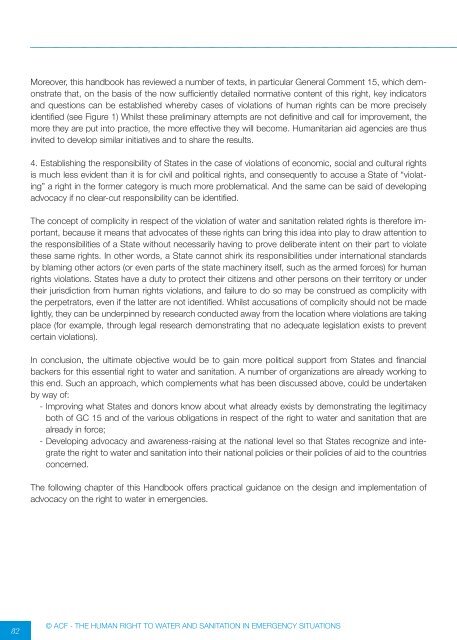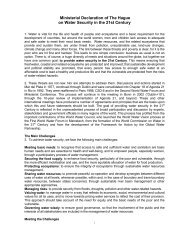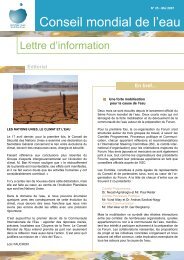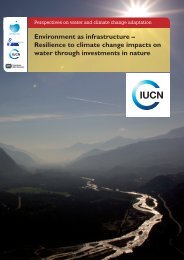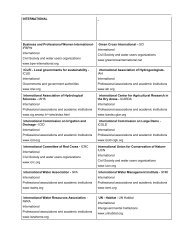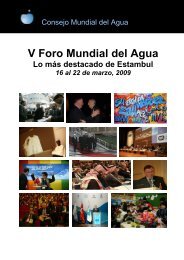the human right to water and sanitation in emergency situations
the human right to water and sanitation in emergency situations
the human right to water and sanitation in emergency situations
You also want an ePaper? Increase the reach of your titles
YUMPU automatically turns print PDFs into web optimized ePapers that Google loves.
82<br />
Moreover, this h<strong>and</strong>book has reviewed a number of texts, <strong>in</strong> particular General Comment 15, which demonstrate<br />
that, on <strong>the</strong> basis of <strong>the</strong> now sufficiently detailed normative content of this <strong>right</strong>, key <strong>in</strong>dica<strong>to</strong>rs<br />
<strong>and</strong> questions can be established whereby cases of violations of <strong>human</strong> <strong>right</strong>s can be more precisely<br />
identified (see Figure 1) Whilst <strong>the</strong>se prelim<strong>in</strong>ary attempts are not def<strong>in</strong>itive <strong>and</strong> call for improvement, <strong>the</strong><br />
more <strong>the</strong>y are put <strong>in</strong><strong>to</strong> practice, <strong>the</strong> more effective <strong>the</strong>y will become. Humanitarian aid agencies are thus<br />
<strong>in</strong>vited <strong>to</strong> develop similar <strong>in</strong>itiatives <strong>and</strong> <strong>to</strong> share <strong>the</strong> results.<br />
4. Establish<strong>in</strong>g <strong>the</strong> responsibility of States <strong>in</strong> <strong>the</strong> case of violations of economic, social <strong>and</strong> cultural <strong>right</strong>s<br />
is much less evident than it is for civil <strong>and</strong> political <strong>right</strong>s, <strong>and</strong> consequently <strong>to</strong> accuse a State of “violat<strong>in</strong>g”<br />
a <strong>right</strong> <strong>in</strong> <strong>the</strong> former category is much more problematical. And <strong>the</strong> same can be said of develop<strong>in</strong>g<br />
advocacy if no clear-cut responsibility can be identified.<br />
The concept of complicity <strong>in</strong> respect of <strong>the</strong> violation of <strong>water</strong> <strong>and</strong> <strong>sanitation</strong> related <strong>right</strong>s is <strong>the</strong>refore important,<br />
because it means that advocates of <strong>the</strong>se <strong>right</strong>s can br<strong>in</strong>g this idea <strong>in</strong><strong>to</strong> play <strong>to</strong> draw attention <strong>to</strong><br />
<strong>the</strong> responsibilities of a State without necessarily hav<strong>in</strong>g <strong>to</strong> prove deliberate <strong>in</strong>tent on <strong>the</strong>ir part <strong>to</strong> violate<br />
<strong>the</strong>se same <strong>right</strong>s. In o<strong>the</strong>r words, a State cannot shirk its responsibilities under <strong>in</strong>ternational st<strong>and</strong>ards<br />
by blam<strong>in</strong>g o<strong>the</strong>r ac<strong>to</strong>rs (or even parts of <strong>the</strong> state mach<strong>in</strong>ery itself, such as <strong>the</strong> armed forces) for <strong>human</strong><br />
<strong>right</strong>s violations. States have a duty <strong>to</strong> protect <strong>the</strong>ir citizens <strong>and</strong> o<strong>the</strong>r persons on <strong>the</strong>ir terri<strong>to</strong>ry or under<br />
<strong>the</strong>ir jurisdiction from <strong>human</strong> <strong>right</strong>s violations, <strong>and</strong> failure <strong>to</strong> do so may be construed as complicity with<br />
<strong>the</strong> perpetra<strong>to</strong>rs, even if <strong>the</strong> latter are not identified. Whilst accusations of complicity should not be made<br />
lightly, <strong>the</strong>y can be underp<strong>in</strong>ned by research conducted away from <strong>the</strong> location where violations are tak<strong>in</strong>g<br />
place (for example, through legal research demonstrat<strong>in</strong>g that no adequate legislation exists <strong>to</strong> prevent<br />
certa<strong>in</strong> violations).<br />
In conclusion, <strong>the</strong> ultimate objective would be <strong>to</strong> ga<strong>in</strong> more political support from States <strong>and</strong> f<strong>in</strong>ancial<br />
backers for this essential <strong>right</strong> <strong>to</strong> <strong>water</strong> <strong>and</strong> <strong>sanitation</strong>. A number of organizations are already work<strong>in</strong>g <strong>to</strong><br />
this end. Such an approach, which complements what has been discussed above, could be undertaken<br />
by way of:<br />
- Improv<strong>in</strong>g what States <strong>and</strong> donors know about what already exists by demonstrat<strong>in</strong>g <strong>the</strong> legitimacy<br />
both of GC 15 <strong>and</strong> of <strong>the</strong> various obligations <strong>in</strong> respect of <strong>the</strong> <strong>right</strong> <strong>to</strong> <strong>water</strong> <strong>and</strong> <strong>sanitation</strong> that are<br />
already <strong>in</strong> force;<br />
- Develop<strong>in</strong>g advocacy <strong>and</strong> awareness-rais<strong>in</strong>g at <strong>the</strong> national level so that States recognize <strong>and</strong> <strong>in</strong>tegrate<br />
<strong>the</strong> <strong>right</strong> <strong>to</strong> <strong>water</strong> <strong>and</strong> <strong>sanitation</strong> <strong>in</strong><strong>to</strong> <strong>the</strong>ir national policies or <strong>the</strong>ir policies of aid <strong>to</strong> <strong>the</strong> countries<br />
concerned.<br />
The follow<strong>in</strong>g chapter of this H<strong>and</strong>book offers practical guidance on <strong>the</strong> design <strong>and</strong> implementation of<br />
advocacy on <strong>the</strong> <strong>right</strong> <strong>to</strong> <strong>water</strong> <strong>in</strong> emergencies.<br />
© ACF - THE HUMAN RIGHT TO WATER AND SANITATION IN EMERGENCY SITUATIONS


